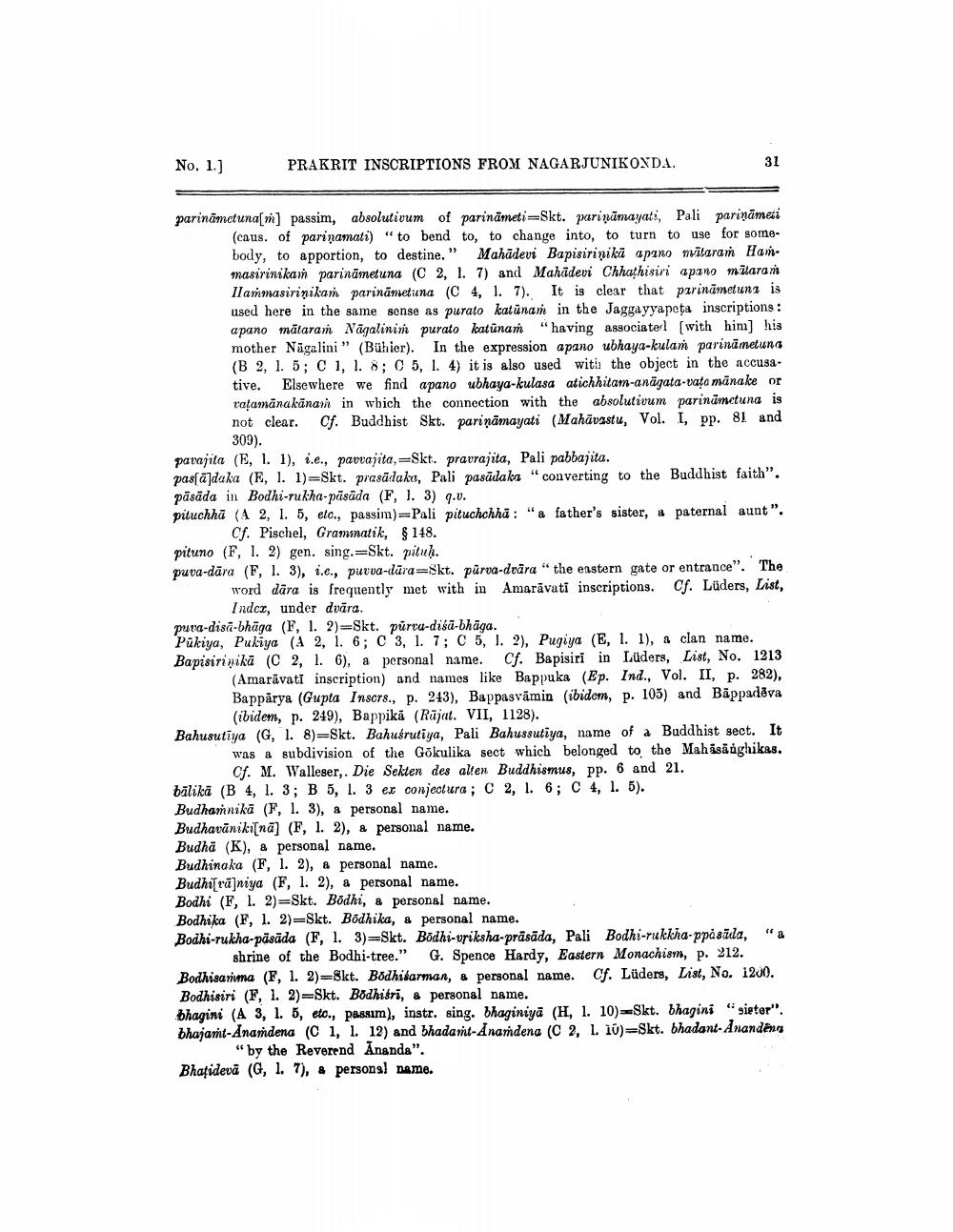________________
No. 1.]
PRAKRIT INSCRIPTIONS FROM NAGARJUNIKOXDA.
parināmetuna[m] passim, absolutivum of parināmeti Skt. parināmayats, Paliparinānei
(caus. of parinamati) "to bend to, to change into, to turn to use for somebody, to apportion, to destine.” Mahadevi Bapisirinikī apino wilaram Hanmasirinikan parināmetuna (C2, l. 7) and Mahadevi Chhathisiri apano mīlara Ilanmasirinikan parināmetuna (
C4, 1. 7). It is clear that parināmetunz is used here in the same sense as purato katunar in the Jaggayyapeta inscriptions: apano mātaran Nāgalinin purato katunań "having associaterl (with him) his mother Nägalini" (Bühier). In the expression apano ubhaya-kulaṁ parināmetuna (B 2, l. 5; C , l. 8; O 5, 1. 4) it is also used with the object in the accusative. Elsewhere we find apano ubhaya-kulasa atichhitam-anāgata-rata mānake or ratamānakānain in which the connection with the absolutivum parinūmetuna is not clear. Cf. Buddhist Skt. pariņāmayati (Mahāvastu, Vol. I, pp. 81 and
309). pavajita (E, 1. 1), i.e., pavrajita, Skt. pravrajita, Pali pabbajita. passadaka (E, I. 1)-Skt. prasīdaka, Pali pasādakı "converting to the Buddhist faith". pāsāda in Bodhi-rukha-pāsāda (F, I. 3) q.u. pituchha (A 2, I. 5, etc., passim)Pali pituchchha : "a father's sister, # paternal aunt".
Cf. Pischel, Grammatik, $ 148. pituno (F, I. 2) gen. sing.=Skt. pituh. puva-dāra (F, I. 3), i.e., purva-dūra=Skt. pūrva-drāra "the enstern gate or entrance". The
word dāra is frequently met with in Amaravati inscriptions. Cf. Lüders, List,
Index, under dvāra. puva-disa-bhāga (F, I. 2)=Skt. půrvu-dita-bhāga. Pūkiya, Pukiya ($ 2, 1. 6; C3, 1. 7; C5, 1. 2), Pugiya (E, I. 1), & clan name. Bapisiriwikā (C2, 1. 6), a personal name. Cf. Bapisiri in Lüders, List, No. 1213
(Amaravati inscription) and names like Bappuka (Ep. Ind., Vol. II, p. 282), Bappărya (Gupta Inscrs., p. 243), Bappasvāmin (ibidem, p. 105) and Bäppadēva
(ibidem, p. 249), Bappikä (Rūjat. VII, 1128). Bahusutiya (G, 1. 8)=Skt. Bahusrutiya, Pali Bahussutiya, name of a Buddhist sect. It
was a subdivision of the Gökulika sect which belonged to the Mahasanghikas.
Cf. M. Walleser,. Die Sekten des alten Buddhismus, pp. 6 and 21. bālikā (B 4, I. 3; B 5, 1. 3 er conjectura; C 2, 1. 6; C 4, l. 5). Budhamnikā (F, 1. 3), a personal name. Budhavāniki[na] (F, 1. 2), & personal name. Budha (K), a personal name. Budhinaka (F, 1. 2), & personal name. Budhi rū]niya (F, 1. 2), a personal name. Bodhi (F, I. 2)=Skt. Bodhi, a personal name. Bodhika (F, I. 2)Skt. Bödhika, & personal name. Bodhi-rukha-pāsāda (F, 1. 3)=Skt. Bödhi-vriksha-prāsāda, Pali Bodhi-rukkha-ppåsāda, "a
shrine of the Bodhi-tree." G. Spence Hardy, Eastern Monachism, p. 212. Bodhisarima (F, 1. 2)=Skt. Bodhisarman, & personal name. Cf. Lüders, List, No. 1200. Bodhisiri (F, 1. 2)=Skt. Bodhisri, a personal name. bhagini (A 3, l. 5, eto, passim), instr. sing. bhaginiyā (H, 1. 10)Skt. bhaginigieter". bhajant-Anandena (C1, 1. 12) and bhadant-Anaṁdena (C2, 1. 10) Skt. bhadant- Anandinn
" by the Reverend Ananda". Bhatideva (G, 1. 7), & personal name.




